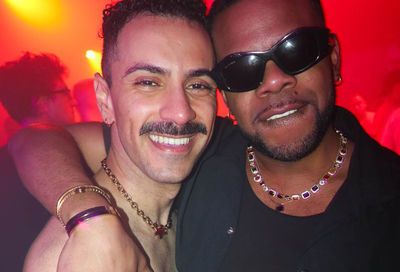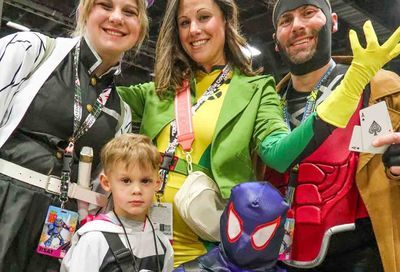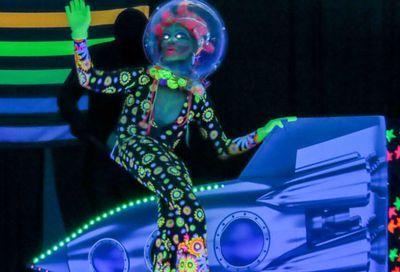Boots, Buckles and Broadway
With a decade under their belts, the D.C. Cowboys are riding high
Growing up on the quiet, conservative streets of Virginia Beach, Va., Kevin Platte discovered at an early age that he had a passion for dancing. The Platte family home movies include scenes of little Kevin kicking up his heels with his sister in the backyard. By middle school, he was signing up for dance classes. Gay rodeos and rhinestones were still a long way off.
Though Platte pragmatically majored in business all the way through graduate school at Old Dominion University in Norfolk, Va., there was always room for dance.
|
“Literally every semester I had a dance classes,” says Platte, recalling his collegiate career in the 1980s. “From ballet to jazz, I took everything I could possibly take. I did it just for fun, to make the semester go by a little faster.”
With his MBA in hand, though, the dancing became not much more than a pastime. Platte’s energy went into his career. What energy was left he spent on random dance floors, shaking under strobe lights to Cher and Madonna. Without formal classes, the clubs presented Platte’s only opportunity to dance. For more than five years, that was how it went.
Platte recalled the scene getting a little tiring as the dance pop ballads of the ’80s began to make way for house, tribal and other music genres that marked the early ’90s gay club scene.
But when friends introduced him to the gay country-western scene, he found the spring coming back into his step. His first trips into this new world were at a club called Kickers during a trip to San Diego, followed up back home with visits to Capitol Hill’s Remingtons.
“I used to hate country-western music,” admits Platte, “but I realized there was a whole dance environment with it. Couples dancing, which is quite intimate and fun, and line dancing for creativity. I learned to love country-Western music. It was an acquired taste.”
Platte wasn’t drawn to the music alone. His years in clubland left him yearning for a different atmosphere, and Levis-clad cowboys fit the bill.
“The environment at country-Western bars is very comfortable, friendly, relaxing,” Platte says. “It’s typically a place where people transition to when they get burned out on club dancing. It took me a while to get used to the music, but I was there for the dance.”
Platte was hooked. With his passion for dance reinvigorated, he became a regular at Remingtons. All the boot scootin’ got Platte’s creative juices flowing, and soon is focus turned to the 1994 Atlantic Stampede gay rodeo.
“I thought, why don’t I get a group of guys together, put a couple of numbers together,” Platt recalls. “I had a selection of twelve guys I knew from Remingtons. I have an eye for being able to see who is a good dancer — people who don’t mind showing off, performing. Good dancers really perform when they dance, and have fun.
“I came up with two very basic numbers,” he continues. “For the most part, everyone was able to dance to them.”
Dance they did, through two months of rehearsals in the basement of a Capitol Hill church. The D.C. Cowboys were poised to make their debut, though not with the level of fanfare that greets them these days. In the summer of 1994, these cowboys were not a sure bet.
“We stepped onto the small auxiliary stage where they put people they’re unsure of,” Platte remembers of their first Stampede appearance. He and the other Cowboys did their best to spread the word among their friends and draw at least a small crowd to the C-list venue. To their surprise, they packed the room for what was supposed to be a one-time appearance.
“No one fell down, no hats got knocked off,” says Platte, adding that he was fairly confident in the group from the beginning. “We were nervous, but I don’t remember any major mistakes. It wasn’t the level of complexity we’re used to now, but it was entertaining and sexy. If you make it sexy, you’re halfway there, especially at a gay rodeo. If you make it sexy and masculine, that’s a formula for success.” The audience agreed.
Recalls Platte: “After the first number, the applause was so overwhelming, the reception was just so incredible that after the rodeo, we got together and said ‘Why don’t we continue?'”
A long-term commitment is not what Platte’s cowboys had in mind. About half were not prepared to further commit to the group. Two months of rehearsals were enough.
Undeterred, Platte and his remaining core set to recruiting more members for the long haul. Bryan Ashby remembers the day the Cowboys came a-callin’.
“I was two-stepping at an afternoon tea dance at Tracks in late 1994, and one of the Cowboys approached me,” Ashby says, maybe a little wistfully. “He was a perfect stranger. I thought he was going to hit on me, but he asked me to join the group. I’d just learned two-stepping, but I’d come from a musical-theater background. I was looking for an artistic outlet at that time, so it was a perfect match.”
While Ashby and the Cowboys may have been a perfect match, he confesses that the new group already had a reputation that made him a little uneasy.
“I felt intimidated by the reputation of the group — good looks, sexy edge. I never pictured myself like that,” Ashby says. Nevertheless, by the end of the audition, he was a genuine D.C. Cowboy.
“We had the first post-rodeo performance in the basement of the Circle bar in January 1995,” Ashby says with a laugh. “Now it’s the [Human Rights Campaign] retail store.”
The performance at the Circle was followed by five or six performances through the end of that year, says Platte. Despite the success at the rodeo, the Cowboys still had to struggle to find engagements.
“We had to beg for any kind of venue,” Platte insists, adding that the group would offer to pay its own expenses just to get an opportunity to perform. “We really had to market ourselves. The rodeo buzz carried us locally, just a little bit. Then there was something in Philadelphia because someone knew a bartender.
|
“Then we started going after the gay rodeos. I knew of only a couple — there were so few back then. We had to convince them who we were. Rodeos are used to dealing with their local talent: cloggers, line dancing groups, drag queens.”
Eventually, momentum built. In the 10 years since its founding, Platte says the Cowboys have claimed a membership of almost 60 men and performed all over of the United States, and some parts of Canada.
The group’s mission, primarily, is to provide entertainment at no cost to benefit events that raise money to support people living with HIV/AIDS, and to support HIV prevention. Over the years, the Cowboys have raised millions of dollars to groups such as the Whitman-Walker Clinic, the Human Rights Campaign, Food and Friends, and the Mautner Project for Lesbian Health.
Moving from pure country-western and allowing a variety of genres to influence the group’s direction, the D.C. Cowboys now have an evolved repertoire ranging from country to Broadway to Cher. Platte says he is most thrilled by one of their relatively recent performances at circuit party called Holloween in New Orleans, inspired by the movie Moulin Rouge.
“It was a huge, huge event,” says Platte. “It was such an incredible show, probably the most memorable in recent history. That was the one that was just wow. We were interacting with other performers. There was a trapeze above us, a big elephant puppet onstage with us, acrobats, can-can dancers, drag queensÂ….”
Obviously, it can be exhausting work. That translates to turnover in the ranks.
“As the Cowboys got more and more successful, it demanded more and more time,” says Ashby, who left the group in 2001. “It was really a hard decision. It was hard to be a part and then leave.”
To counter the losses, the Cowboys hold auditions for new members every November.
“I realized the importance of new people, new blood every year,” Platte explains. “It energizes existing members and gives fans something to look for. Every new person brings in some new skills, new contacts. It keeps the boys on their toes. Everybody wants to vie for that front-row spot.”
Platte adds that there is not a fixed number of spots available for new dancers, and that the newcomers never push out the veterans: “Once you’re in, you’re in till you take yourself out.”
Having joined in 2001, Shane T. Reppert is part of the 21st century crop of Cowboys. Like Platte, Reppert’s two-stepping journey also began at Remingtons.
In January 1997, Reppert found himself alone in Capitol Hill after an evening of apartment searching. He remembered that he’d heard of a gay bar in the area, but he didn’t know its name or where it was. Directory assistance was remarkably helpful, says Reppert, and he was soon walking through the Remingtons front door.
“I saw these two lumberjacks waltzing — big, burly guys with these huge smiles” says Reppert, a stranger in paradise. “I thought it was the most beautiful thing I’d seen in my life. I finally got to do what I always wanted to do at every high school dance. That’s where it all began.”
Reppert, who already had formal dance training, took to the country-western moves immediately, becoming a Remingtons regular. After a time, he met quite a few D.C. Cowboys and was asked to audition. But in 1997, Reppert was traveling frequently for work, and was committed to a gay volleyball league.
But in 2001, with a job change and a break from volleyball, Reppert was ready and raring to sign up. He hasn’t looked back.
“I get an opportunity to dance and travel, which are two of my passions,” Reppert says, granting that the attention is not such a bad thing either. “The lights and all that — it’s a little bit of celebrity.”
Reppert adds that he plans to stick with the Cowboys for the foreseeable future. Ashby would likely advise him to stick with it as long as he can.
“First and foremost, the camaraderie was among the best I ever had in my life. It’s a fraternity. It was a good group of guys. I’m sure it still is,” says Ashby. “I don’t miss the commitment and hard work, but whenever I see them perform it’s a bittersweet feeling. You wish you were up there.”
It’s a wish he’d rather leave ungranted, he jokes, insisting he would never return to the fold. “I say that laughing, because my body just won’t handle those rigors anymore,” says Ashby, seeming a bit premature at just 40. “I was talking to [dancers] from my era — your knees are aching, your back is aching. You really start to feel your age.”
Platte, as the “father” of the Cowboys seems reluctant to name his age. He prefers to point to general spots in decades rather than to specific years that might date him. It’s enough that know that both Ashby and Reppert say his emotional maturity has been the glue the keeps the Cowboys together.
“He’s a remarkably mild man,” observes Reppert, saying that Platte manages to keep his Cowboys in line. “Get a group of 20 gay guys in a room, all the personalities, we get irritable sometimes. His organizational skills are astounding. He’s very dedicated.”
Ashby’s sentiments are the same. “Beyond keeping a bunch of strong personalities together, the fact that he’s kept this Washington institution together — it’s beyond a fulltime job,” he echoes. “I can’t say enough about his effort to keep this going. His vision and commitment never wavered.”
Platte, on the other hand, points not to himself, but to the formula the Cowboys employ, when crediting their staying power.
“I think what people find exciting about D.C. Cowboys is not only are we well trained, it’s sexy, it’s masculine,” he says. “It looks like we’re having a lot of fun out there. But we’re approachable. We’re part of the community. And we put on a good show. It’s truly musical theater. Sometimes it’s not cowboy-themed, but it’s always masculine and sexy. When you see [a bunch of] good-looking guys onstage who move well, that creates excitement.
“You really can’t change a formula that works. It’s taken us a few years to get the right mix, the right level of professionalism. We know what our audiences like and what they want. There’s no plan to change the formula. It works.”
Platte promises that audiences can count on the sexy-masculine formula when the D.C. Cowboys perform at this weekend’s Atlantic Stampede. He admits that they can count on something special to mark the group’s 10-year anniversary, as well.
“We’re going to end with a number that really defines us as dancers and entertainers,” says a tight-lipped Platte, not wanting to give away too much. “We’ve got to leave ’em wanting more. Let’s just leave it at that.”
Platte is more forthright offering what he’s learned from the decade-long ride with the Cowboys. “Take action and follow your passion!” he exclaims. “I’ve learned that a successful organization requires commitment, dedication, passion, a good product, and most importantly, in our case, talented dancers. The benefits are the life experiences and personal relationships that I will always remember. It’s been a life enriching experience on many levels. I’m still amazed at where it is right now. Amazingly, it just keeps getting better and better each year.”
For more information about the D.C. Cowboys, visit www.dccowboys.org on the web.
Support Metro Weekly’s Journalism
These are challenging times for news organizations. And yet it’s crucial we stay active and provide vital resources and information to both our local readers and the world. So won’t you please take a moment and consider supporting Metro Weekly with a membership? For as little as $5 a month, you can help ensure Metro Weekly magazine and MetroWeekly.com remain free, viable resources as we provide the best, most diverse, culturally-resonant LGBTQ coverage in both the D.C. region and around the world. Memberships come with exclusive perks and discounts, your own personal digital delivery of each week’s magazine (and an archive), access to our Member's Lounge when it launches this fall, and exclusive members-only items like Metro Weekly Membership Mugs and Tote Bags! Check out all our membership levels here and please join us today!

 DC Cowboys’ 2004 Pride Parade Float
DC Cowboys’ 2004 Pride Parade Float 


 DC Cowboys’ 2004 Pride Parade Float
DC Cowboys’ 2004 Pride Parade Float 














